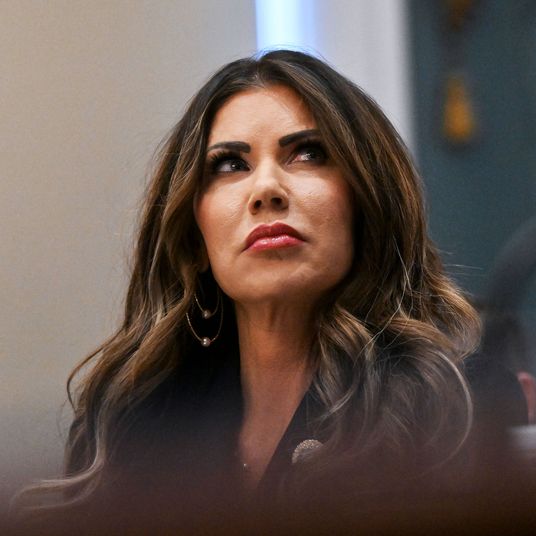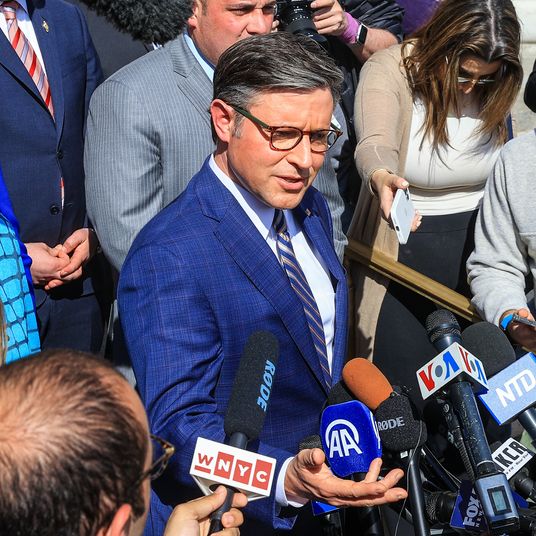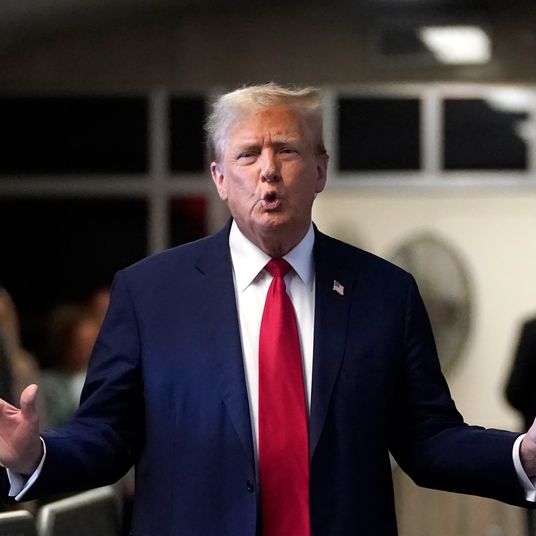
Last week, Don Lemon announced that he’d been X-ed by Elon Musk. Shortly after the former CNN host conducted an interview with the billionaire for the first episode of his new talk show, which launches on March 18, Musk abruptly canceled the promotion deal X had worked out with Lemon — apparently because Musk had a tantrum after disliking the questions Lemon asked about his ketamine use. In the latest episode of the Pivot podcast, Lemon shared his account of the aborted partnership with Kara Swisher and Scott Galloway. In the below excerpt, Lemon explains how much X seemed to want him and his (non-right-wing) content to pitch to advertisers, how alleged X CEO Linda Yaccarino handled the mess, and why he still expects to get paid.
Subscribe on:
Kara Swisher: So tell us what happened.
Don Lemon: You mean how this deal came about?
Swisher: Yeah.
Lemon: So, as you know, Elon Musk very publicly tweeted, saying, inviting me to the platform. And then, Tucker [Carlson] eventually started a show and he said, “This is what everyone should be doing. Don Lemon should be doing this.” And then I got a phone call from someone — I told you, I don’t know if you want to mention the name, but you said that they were acting on behalf, obviously they were acting on behalf of Elon, someone who is in a very high-profile position, bold name — who said, “You should do this, it’s great for you, blah, blah, blah.” And so that was very early on and I said “no.” And then Linda Yaccarino was signed on as CEO. And she knows a lot of people that you and I know, very respected people.
Kara Swisher: She was at NBC.
Lemon: She was at NBC, and they said wait till Linda gets onboard. And we did. And then they reached out again. They kept reaching out and they kept pursuing me … And they kept sweetening the deal. And I said, “Of course.”
And so we started working — I said, “I will only do this if I can be myself on your platform. The only reason I’m coming to your platform is because I think Twitter” — I think it was Twitter at the time or maybe it was changing into X; whatever, that’s interchangeable — “I think it’s the biggest platform for news, besides being on a network and for people who are speaking out and who are commenting on news and people want to know about news. If there’s a breaking story, the first thing they do is they pick up their phone, they go to Twitter, they go to X, and they want to see what’s trending or what have you.” And I said, “I want to be myself, and I’m going to have to criticize the person who owns this platform.”
And they said, “That’s completely fine. That’s what we want. We want you to be you. And we’re all about free speech. Elon’s a free-speech absolutist.” He would text me, we text each other, and we would talk about these things. He said, “I want you on the platform. This is what you should be doing.” And everyone said, “You’re going to be free to be yourself.” And that’s how it came about, right?
Swisher: Can you give specifics? They gave you a lot of money to be not exclusive. I think people were confused by this. You could be anywhere, right? You can put your stuff, your new show, on YouTube or Instagram or wherever you feel like, correct?
Lemon: Yeah. I’m not going to — look, I’m not going to go into specifics about the money and that’s not what you’re asking me. But was there a financial part of it? Absolutely. Was it, you know, enticing? Absolutely.
Swisher: What did they get? For an extra ten minutes?
Lemon: Yeah. So here’s the thing. Everyone thinks it was an X show. It was not an X show. It was my show produced by my production company, which is called Lemon or Lemon Media Network. Produced by my company. They had no editorial control over it at first. We wanted to do five days a week and then I said, you know, everyone in this business said, “That’s too much. Do three days a week.” You even told me that, like, “Don’t get crazy.” And so we decided to do three days a week and three shows a week.
What X wanted was some exclusive material. So I think I had to give them like ten videos, or something like that, per week. And I think they had to be like ten minutes long or what have you. That was extra things on top of the episodes. My episodes were already going to air everywhere, and they’re going to be on YouTube, they’re going to be on iHeart … wherever you get streaming or podcasts. And so they just wanted to add extra material on top of that. And that material had to be exclusive to them for 24 hours. And then it went everywhere.
That’s all they got. And so I said, “If you’re going to pay me this money and I’m going to be posting on your platform, if I didn’t get this for free, it’s a no-brainer. You’re giving me money to post on X.” So it was a no-brainer to me because people promote their material and their content on X anyway. Even people who don’t like it, they’re still on X. And I asked a lot of people, “You don’t like X; why are you still on it?” They said, “Because there’s nothing else better.” So that was a deal.
Swisher: Let me ask you one more quick question on that. Scott can jump in. So they were they selling your advertising?
Lemon: Were they selling my advertising? Yes. They were selling advertising around me.
Swisher: Around you on X.
Lemon: And I think what they wanted was someone who was not an extremist, someone who wasn’t a right-wing conspiracy theorist that they could sell to the advertisers.
Swisher: And they took you to CES and showed you off. Linda likes to do that — had a dinner and showed you off to advertisers, correct?
Lemon: Yes. And do you know this? I want to say something, but I don’t know if I should say it.
Scott Galloway: Oh, you should.
Lemon: I should.
Swisher: Go ahead. Yeah.
Lemon: Why not? They said to my representatives: If I didn’t get on a plane and go to CES, the deal was off.
Swisher: Okay? So they needed your face.
Lemon: They needed me there and then they trotted me out to their clients and their potential advertisers and what have you. “Look: Don Lemon!” and I was always either the marquee person right at the top of the thing or the person that they’re like, “And finally, Don Lemon — yeah!”
You know what I mean.
Swisher: Yeah, we’ve been at those dinners. All right, Scott?
Galloway: Yeah. Don, good to see you. So I don’t want to speak specifically to working with Elon Musk, but what’s it like to work with a malignant narcissist who is abusing a dissociative narcotic? Just generally speaking.
Swisher: God.
Lemon: Well, I’ve never worked with you, Scott, so I don’t know.
Galloway: Don, bring the fire.
Lemon: Listen, your question is moot, I think, because I never really worked with him. I didn’t have that much contact with Elon Musk. The contact I had with him is he called me. I think he was in Paris. We had a long conversation for about 45 minutes in the summer. After I spoke to him, I spoke with Kara and I said, “I don’t want to do this.” Because he was very nice on the phone. I think it was his mom who was sitting there next to him and we were talking about it. He’s very kind, very friendly. I have nothing against Elon Musk. As a matter of fact, during the interview, I felt some empathy for him because I was just like, This is someone who is a brilliant man in some aspects, but he’s emotionally immature. And I could pick that up in the interview — and a bit insecure.
But I have nothing against Elon Musk. I’ve never really worked with him. I have never met him in person, had never met him in person until I did that interview. We shared some texts. You know, “I’m going to call you,” or “When are you free?” And then, around DealBook, I texted him and I think I said something like, “Wow, surprising you said that, but here’s what I like that you said.” And he said, “Free speech is for, is when people you don’t like say things you don’t like.” And I said, “You know what? I agree with you on that. That’s probably one of the only things that we agree on. I may not agree with you, but I’m going to fight like hell for your right to be able to say it.”
Swisher: I just want to tell people who don’t know that Musk kind of had a meltdown onstage with Andrew Ross Sorkin and said, essentially said, “Fuck you” to Bob Iger. But go ahead.
Galloway: That’s exactly what he said. “Go fuck yourself.” That’s what he said. Okay, so Mr. Free Speech consistently says it’s important that people say what they want to say, but people don’t like it. What did you say that he didn’t like that he then fired you unceremoniously for.
Lemon: Uh, you’ll have to ask him, Scott.
Galloway: But you were in the room, Don.
Swisher: What’s your sense?
Galloway: What do you think upset him enough to — like literally, my understanding was within 24 hours —
Lemon: Facts, Scott.
Galloway: Right.
Lemon: When presented with facts about things that he tweets about, and I’ll still call it tweeting, about his posts. He didn’t like that. When I asked him about his, you know, his alleged drug use that’s been reported in The Wall Street Journal, very credible organizations. When I asked him about his ketamine use that he himself had tweeted about, he himself put out there, he bristled at that and I said, “I wouldn’t talk about these things, Elon. I wouldn’t talk about your ketamine use if you had not publicly said that — how would I even know about it?”
And he actually had a very good answer. He said, “The reason I talked about it is because I thought it would help people. And if you’re on SSRIs, maybe you should consider taking ketamine.” And I think he’s absolutely right. I myself have suffered from depression. He talked about depression and, you know, his use of ketamine. And I said, “I have suffered from depression, and I agree with you. You should try different things.” I used to do talk therapy, and my doctor actually tried drug therapy on me. I’ve done stories about people with PTSD who have done ketamine and other drugs, and it has actually helped them. So we agreed on that. But that went over his head. I don’t think he even heard it because I just don’t think that he liked sitting there taking questions from me, someone that he has a history with, and just being held accountable, and just being held to facts.
When I talked about DEI and about what he tweeted about — you remember the Alaska Airlines pilot who, when the door blew off and she landed the plane successfully. He said, somehow, that it was a DEI thing. I said, “But this is a woman who’s landed a plane successfully. That means that she is actually qualified to do a job. So I don’t understand why you’re tweeting the things that you’re tweeting. There’s no evidence of what you’re putting out there.”
And he said, “Well, it would just be awful it we’re lowering the standards on air safety and if we’re lowering the standards for medical school because of DEI.” And I said, “Yes, that would be awful, but there is no actual evidence that it is happening. So why are you doing it? It is hypothetical.”
He said. “All I’m saying is that it would be terrible and we shouldn’t do it.”
I said, “Yes, everyone agrees with that, but why would I say it, because it’s not happening!”
Swisher: Right. And what did he say? He didn’t like pushback.
Lemon: He didn’t. He didn’t like pushback. But I am raising my voice now, louder than I did in that interview because I did not want that to happen. So I was very calm. And I asked him, if you see, it’s just straightforward questions with follow-ups and that’s it.
Swisher: Right. So he called your approach “basically just ‘CNN, but on social media.’” And it was “really just Jeff Zucker talking through Don.” Who you worked with — Jeff Zucker — at CNN. How did you react to this?
Lemon: Um, it was stupid. I mean, that was read to me secondhand and I think he tweeted about it. Or at least it was in his response to the press, after this happened. I mean, I think it’s silly. I think he thinks by putting Jeff’s name that it’s somehow going to get more attention. And he’s being a provocateur because people may look at Jeff as a person, well not may look at Jeff — they obviously know he ran CNN. And so that is sort of, that adds to the, you know, He’s a liberal, a lefty, CNN person. And so that adds to that. And I think it gives him credibility in that right-wing conspiracy world, or that right-wing sort of bro-podcast world, where people don’t like the mainstream media but they watch Fox News all the time, which is part of the mainstream media.
Swisher: Yeah. Which he also is making up.
Lemon: Ever Wonder Studios is producing my show. And I was approached by Ian, who formerly worked for Time Inc., for Ever Wonder Studios. It’s a coincidence, but I’m proud to work with Ever Wonder Studios, and I’m proud to work with Jeff Zucker. And I think Jeff Zucker is one of the most talented media executives to ever live. And so to have him as a personal friend and as a mentor and someone who counsels me occasionally, I am not ashamed of that at all. I’m actually very proud of that. I’m lucky to have that, in my mind.
Swisher: Right, because you shouldn’t be [ashamed]. Let me ask, when you left the interview — you know, when I do interviews, I sort of know how they feel, essentially. Did you have any idea how he felt?
Lemon: I did. I did.
Swisher: I kept texting you. I was like, “Oh, you’re going to get fired tomorrow no matter what you did.”
Lemon: Yeah I did … I think I said it wasn’t comfy at times. I think it’s what I texted you, and it wasn’t. It was tense.
Swisher: So when you left, you weren’t thinking there was an issue. Did anyone else there from X think it was an issue? Did you hear from Linda or anybody else?
Lemon: Here’s the thing. I didn’t think it was an issue because I’ve had tense interviews before, and it wasn’t quite a walk-off, but it was — at the end, he was like, “Choose your questions carefully because I have to go,” and “I don’t like” — basically saying “I don’t like the direction of your question.”
Swisher: Yeah. But that’s his move. He did that. He’s like, “I’m gonna leave, I’m going to leave.” It’s very Norma Desmond of him.
Lemon: I stayed very calm and that was my reaction whenever he threatened to leave or whatever, it was just like, “I think this is really good. This discourse is really good. And I think you should continue.”
Swisher: Yeah, you have to do that. But it’s really ridiculous that you have to baby a billionaire.
Lemon: But at the end, he did say they — they said at least an hour. They didn’t say it had to be one hour. They said at least an hour. And he said, you know, “I’ve been here for an hour, and I have people waiting for me, and I have to go.” But he grew, measurably, I think, more uncomfortable toward the end of the interview. And he said, “Choose your questions wisely because I gotta go.” You’ve been there.
Swisher: Yes. Oh, he does the stupid, threatening “I’m walking off” — and never does — bullshit. It’s one of his moves. It’s ridiculous.
Lemon: But I knew he was upset when he left. I knew he wasn’t happy. But I thought, you know, he’s done this before. I thought he had done this before … and he’ll be fine. It was just him not being used to answering questions. And when I looked over the interviews that he did, most of them are from a friendly crowd, from people who had basically the same similar worldviews as his. And for someone like me, who looks completely different than him, who has a completely different background and a completely different worldview, to be held accountable, and to question him, I thought was just —
Swisher: Just he’s not been in that world. He’s been steeped in people who agree with him violently for a long time.
Lemon: I just think it was, for him, it was just like, Why am I doing this?
Swisher: Yeah, exactly. So fast-forward. You did it. And then you heard this thing. Did you hear from Linda — ever, did she write you — who has been slavishly trying to land your deal?
Lemon: Fast-forward to when?
Swisher: When they heard about it.
Lemon: Yeah. So, that interview happened on Friday. So we spent the next afternoon in Austin, and I was trying to — remember I was trying to hook up with you just to say “hi” or to do something, but I had to leave. And so I land at Newark airport on Saturday evening, very rainy Saturday evening. And my agent called and said, “Hey, I need you to step out. Where are you? I’ve got to talk to you” … He said, “Well, I just got a text from Elon.” I said, “Okay, what did he say? He was very upset. He read me the text. It was kind of, I don’t know if I would say vulgar. But —
Swisher: Yes, I’ve gotten that text from him.
Lemon: You would say vulgar?
Swisher: Probably.
Lemon: It was very insulting. And then he said, “Deal canceled” or “Contract canceled.” And so I was sitting next to my executive producer, Jonathan Walden. I said, “I’m on with Jay, and he said that Elon said the contract was canceled.” We looked at each other like: What? Why? And I don’t know, in that moment, I was just like, “Good. Good. I’m tired.”
I went into this with my eyes open, but I was so tired of the pushback that I was getting from people who really loved me, from people who really supported me. And although I thought I was doing the right thing, I knew I was doing the right thing because I wanted my work to be presented and amplified to the biggest, to the largest number of people who could receive it. And I do believe, as you know, in free speech, and I do believe that we should have better discourse in this country with people we don’t agree with. My mom and I have disagreements all the time. I still go to visit her for Thanksgiving or Christmas or whatever. She’s coming to my wedding or whatever, I mean, but we still love each other. We don’t do that in this country.
Swisher: She doesn’t say “sonship canceled.”
Lemon: She doesn’t say that.
Galloway: I mean, my sense is, Don … You’re probably still processing this, but if you were going to try and launch a show, the biggest get would be to get Elon Musk to do your initial show. The even bigger get is to get him and then have him freak out and fire you. I mean, isn’t this out of central casting for how to launch a show? Isn’t this a great thing? Because I mean a couple things. My understanding is the way you’ve depicted it is you have a show, and Twitter, which is going to be one of many distribution outlets. One, does that mean the show is going to air? And two, I just can’t imagine this playing out any better for Don Lemon. Your thoughts?
Lemon: Yeah, you’re right. So the moment I got the call, that’s what I said. I was like, Well, if he is going to cancel this contract — because at first I thought, Well, he’s just being petulant and, you know, cooler heads will prevail and whatever, but if he does — do it before the show airs. Because as you said, Scott, that would be the best thing to happen to me. Do it before the show airs and tweet about it, if you’re going to do it. And so I could not have asked for a bigger promotion for the show than this.
But, you know, I think that in the long term, having X onboard, and if I could have done some work with them, I think it would have been helpful in the long term to the growth of the business promotion because, you know, they use the algorithm. And I told you I was using their analytics; basically, I was going to use them as a newsroom, as my newsroom. Since I don’t have that big newsroom behind me.
Galloway: Let me just ask a crass question — do you get paid out?
Lemon: That is something that you’ll have to ask my representatives. We’re still in the middle of that. I have an agreement with them, and I expect them to abide by that agreement. And if they don’t, they’re in breach.
Galloway: Well, you weren’t terminated for cause, so why wouldn’t you be paid out?
Swisher: Well, let me — because apparently he didn’t sign this contract. Is that correct? Even though he said “Contract canceled” and therefore is acknowledging there’s a contract. Correct?
Lemon: Again, to my understanding — again, I would prefer my representatives to discuss this — that there was an agreement, that we have an agreement. And again, they said if I did not go to CES, that the deal was off. They announced it to the world.
Swisher: Yes, they did do a press release.
Lemon: They trotted me out.
Swisher: They touted it quite a bit that you were going to be there.
Lemon: Yeah. To trot to me out to advertisers, I went to several events, at X, to entice advertisers and to meet all of their employees. We had a deal, and I expect them to abide by it, and I will, we will go to court if we have to.
Swisher: But you didn’t sign; is that correct? Just because there’s been lots of different reporting.
Lemon: Um, I don’t know what the representatives — I did not, but I don’t know what —
Swisher: Okay. All right. I’ve been in those contracts. So in any case, have you spoken to Yaccarino at all? Did you hear from her at all?
Lemon: I heard from Linda the next morning. On Sunday morning.
Galloway: Did she know what had happened?
Lemon: That’s a great question.
Galloway: Did the CEO know?
Lemon: No. The CEO got a text from Elon. She never — she had not, when I spoke to her, she had not spoken to him. She called me to say, you know, to try to smooth it over and to find out what happened. And, “I just want to know what was going on because, you know, I haven’t even spoken to him, and I’m waiting to get in touch with him and what have you.” But I think it took a while for her to get in touch with him.
Galloway: Well look, he fired the wrong person, Don.
Lemon: Let me tell you. Look, if there was ever any question about who is running X, there isn’t one now. It’s Elon Musk. That’s who’s running X.
Swisher: Did she apologize? She never — she makes so many excuses for him.
Lemon: I don’t remember if she apologized, but she was very apologetic, if that makes sense.
Swisher: Right. Yes.
Lemon: It was sort of very contrite and saying, you know, “I want to smooth this over.” You know, “I think that you’re great for the platform. We love having you on the platform. You’ve been a team player,” blah, blah, blah. And, “I think that I want to get Elon to understand — ”
And quite frankly, I said, “I think that he was just uncomfortable in the moment. And what will actually turn out in the interview is he’s going to look better than he thought, right?” Because this wasn’t a gotcha interview. This is just a Q&A. I was just having a conversation with him. Questions and answers. And I think just because he was so uncomfortable for some reason, for my mere presence and questions, I just think that was the discomfort. When you see the interview, there are nuggets in there. He does make news in there. I don’t attack him. And there are no gotcha questions. I think people are going to walk away from this interview and say, they’re going to say, “What did he fire him —” well, he didn’t fire me because I didn’t work for him — but “Why did he cancel the contract?” I think people are going to, I think even his own people will wonder, What the hell?
Swisher: They will say nothing to him. They will say nothing.
And so if he called you and said, “Oh God, I really flew off the handle. Would you come back?” What would you say to him?
Lemon: I would say, “Pay me what you owe me. And it was great, that I really enjoyed this learning experience. And the best of luck to you and everyone at your organization.”
This interview has been edited and lightly condensed for clarity.





























